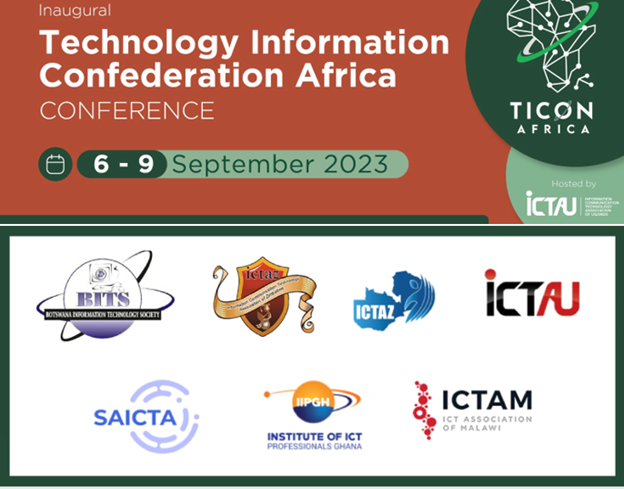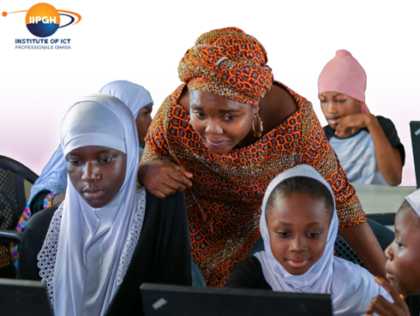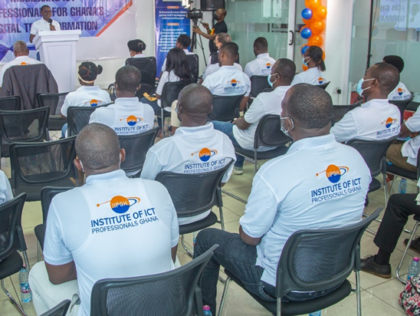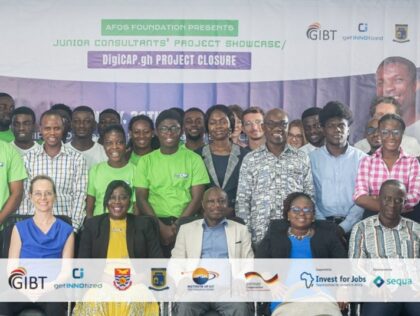Unifying ICT Talent to Power the Continent to 2030 and beyond
TICON Africa serves as a unifying platform for ICT professionals across Africa, aimed at promoting excellence in the field of technology through education, networking, and collaboration among its members with the goal of bringing together a community of like-minded professionals who share a passion for advancing technology and driving innovation in Africa.

The Technology Information Confederation Africa (TICON Africa) is the ground-breaking Pan-African body of technology professionals spearheading the ongoing development of the highest possible standards of information technology knowledge and practice across Africa. It is a continental nonprofit organization which aims at adding value to African ICT professional associations across the continent through research and development on ICT needs on the African continent; publications of ICT related activities in various countries for knowledge sharing of best practices; education to build capacity of ICT professionals in various countries through professional qualifications; networking events such as annual conferences that brings together ICT professionals from different African countries to share knowledge and business contacts, and finally, revenue mobilization for capacity building of professionals in various countries. Founded in 2022, its founding members are ICT Association of Zimbabwe (ICTAZ), Information and Communications Technology Association of Zambia (ICTAZ), Institute of ICT Professionals, Ghana (IIPGH), ICT Association of Uganda (ICTAU), South African ICT Association (SAICTA), with its first elected president from Ghana (David Gowu, IIPGH). Its new additions are Botswana Information Technology Society (BITS), and ICT Association of Malawi.

The objective of TICON Africa is to add value to its members by helping them to develop standards for African ICT professionals and make ICT a career worthy of choice to propel socio-economic development of the continent. TICON Africa is poised to connect with all active ICT professional associations in all countries on the African continent to build a vibrant confederation that will ensure standardization of professional qualifications, research, publications, events, and regulation reforms. In addition, it aims at supporting countries without ICT professionals’ association to set up and mobilize professionals within those countries.
The Inaugural TICON Africa conference, took place at the Imperial Botanical Beach Hotel, Entebbe, Uganda, from September 6 – 9, 2023, aiming at powering Africa into the future with the latest technological innovations. Hosted by the ICT Association of Uganda (ICTAU) this year seeks to unify ICT talent and pave the way for a brighter future for the entire continent.
The conference features keynote speeches, interactive sessions, and panel discussions to equip delegates with the knowledge and skills to tap into, and to develop Africa.
The technology space in Africa is developing rapidly as governments and businesses on the continent are deploying technology to transform and become more efficient. New and emerging technologies such as artificial intelligence (AI), internet of things (IoT), software engineering, robotics, virtual reality (VR), augmented reality (AR), metaverse among others are becoming common. Technology has become an effective tool enabling how individuals and businesses interact. It has also helped governments engage their citizens, and influencers such as celebrities connect with their community, fans, and followers. However, the continent is yet to realize the full potential and benefits of these emerging technologies due to skills gaps, technology infrastructural gaps, cultural barriers, regulation red tapes in some countries just to name a few. One major area identified to help bridge the gap is building the capacity of ICT professionals across the African continent through a platform that will help with knowledge sharing, skills development, partnerships, and investment by technology organizations.
Our theme for this conference, “Unifying ICT Talent to Power the African Continent to 2030 and Beyond,” underscores the urgency and importance of our mission. Africa stands on the brink of a digital revolution, and it is our collective responsibility to ensure that this transformation benefits all its people, leaving no one behind.
Opening the conference, Professor Robert Ebo Hinson, Pro Vice-Chancellor, Ghana Communication Technology University, touched on Strategy and Technology, Expanding the Success of Pan-African Brands.

The 3 -day event delved into critical sub-themes.
Bridging the Digital Divide: Africa’s technological disparity hampers progress in multiple sectors, which requires strategy to ensure equal access to technology, connectivity, and digital resources across the continent.
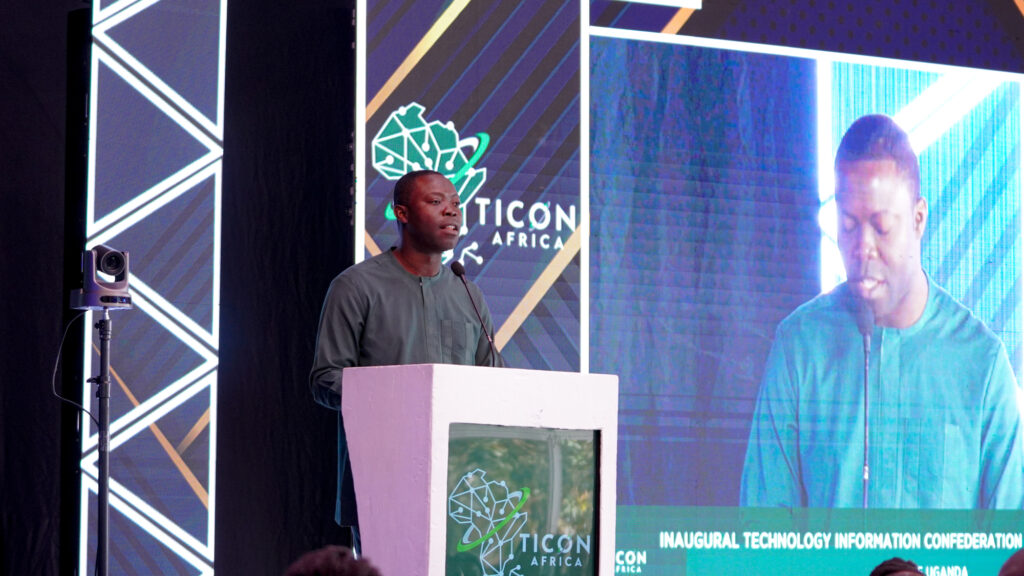
Capacity Building and Skills Development: Empowering our young people with ICT skills, promoting digital literacy, and fostering entrepreneurship as essential steps toward a brighter future.
Public and Private Sector Collaboration: By enhancing collaboration between public and private organizations, to leverage ICT for sustainable development, creating lasting impact.
Innovation and Emerging Technologies: Exploring the potential of emerging technologies, such as artificial intelligence, blockchain, and the Internet of Things (IoT), in transforming Africa’s future.
Policy and Regulation: Robust policies, regulations, and frameworks crucial to supporting the growth of ICT infrastructure and digital innovation in Africa.
Day 1, Bridging the Digital Divide

The keynote speaker, Professor Fred McBagonluri, President of Academic City University College, Ghana, spoke on Unveiling the State of ICT and Comparative Analysis Across the Continent, which set the tone for a panel discussion on Bridging the Digital Divide in Africa, moderated by Badru Ntege, Co-Founder and Director Technology and Innovation, NFT Consult, Uganda. On the panel were, Alain Gbeasor, Technology and Digital Entrepreneur, Ghana, Binimbi Chellah, Business Solutions Development, Sybrin, Zambia; Francois Venter, Project Lead, Belgium Campus iTversity, South Africa; and Aidah Bukubuza, Founder & Team Lead AYDIA Gender and Technology Initiative, Uganda.
Michael Nyitegeka, Director, Refractory, Uganda, addressed the second topic, The State of ICT in Education, leading to the next industry panel discussion, The Future of ICT Education, moderated by Hanna Schlingmann, Project Manager, AFOS Foundation. The panelists were Grace Achire Labong, Manager, International Business Development, East and Central Africa {ECA}, Arxia; Dr Jan Mentz, Academic Dean, Belgium Campus IT University, Richard Kafui Amanfu, Operations Director, IIPGH. This was followed with the last discussion for the day on Skills Development Initiatives: Coding Caravan & Tech Education, moderated by Angela Semwogerere, MD Spidd, Africa, with her panelist Gifty Mottey-Gowu, Administrator, IIPGH Coding Institute, and Juliana Ametorwogo, RF Specialist, Vodafone Ghana.
Day 2, Public & Private Sector Collaboration | Innovation & Emerging Technologies
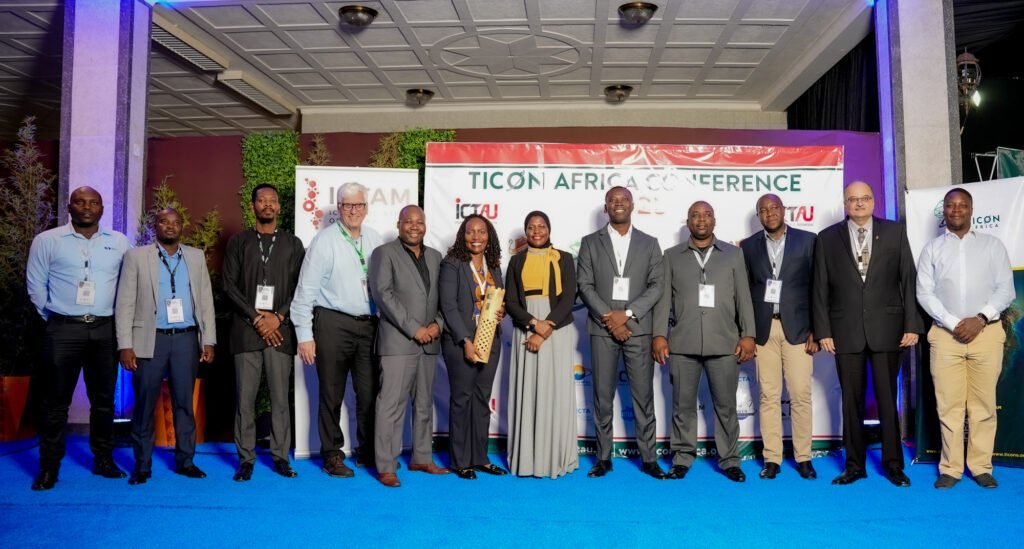
Dr Aminah Zawedde, Permanent Secretary, Ministry of ICT and National Guidance, Uganda, started the day on the topic, One Africa, One Vision: Collaboration for Inclusive ICT Development. This led to two great presentations. “Unveiling the Uganda’s Digital transformation roadmap”, by Shirley Gladys Nakyejwe, Senior ICT Officer & Intellectual Property Management Specialist, Ministry of ICT and National Guidance, and “Unleashing Public-Private Partnerships & Policy Frameworks”, by Dr Piet Kommers, UNESCO Learning Technologies.
Discussing Innovation & Emerging Technologies, Noah Baalessanvu, Head of Technology – Savannah, presented on Blockchain and Cryptocurrency.
Dr Jabu Mtsweni, CSIR Chief Researcher and Centre Manager, in his address, Information and Cyber Security Research, prepared the delegates for the day’s panel discussion on the topic, Generative AI a Productivity Panacea or Pandora’s box. Moderated by Emmanuel Gbeve, CTO, AIDEC Digital, Ghana.
The last presentation for the day centred on Cybersecurity in Digital Inclusion by Harish Bhaat, Data & Cybersecurity Specialist, led to Q&A conversation for the day on “Insights into the dynamic world of cybersecurity for the board”.
Day 3, Marketing, and ICT
The closing plenary keynote on Marketing and ICT – working together to attain Africa’s $3.4 trillion opportunities for the AfCFTA, a trade agreement that brings together a population of over 1.3 billion people and a combined economy of about USD 3.4 trillion, was addressed by James Byarunhanga, Managing Director, Raxio Data Centre, Uganda. This led to further discussions by Professor Robert E. Hinson Pro Vice-Chancellor, Ghana Communication Techn University; Mr. Terrance Alinda – COO Liquid Technology; and Jackie Namara Rukare, Marketing & Business Consultant, Uganda. Moderated by Michael Nyitegeka, Director, Refractory, Uganda.

The final presentation for day 3 was on “New Exponential World (find your purpose) – Changing Technology, Changing Customer, Changing Competition” presented by Mr. Edgar Kasenene, CEO IDEX, gave in to the last panel discussion on the topic, “The pace of business transformation in the face of rapidly evolving technological innovation”. Moderated by Haruna J Mawanda, ICT business transformation Specialist, and panelists Elolo Konglo, Head IT Infrastructure HTU, Ghana; Herbert Olowo, Head of Operations & IT, Absa Bank, Uganda; Ken Stober, CEO and Co-Founder of Simplifi Networks, Uganda; Clement Sinyangwe, Head ICT, Chalimbana University, Zambia.
Conference Summary was given by Professor Fred McBagonluri, President of Academic City University College, Ghana, touching on “Summary of Challenges and Opportunities – Call to Action – Bridging the Digital Divide in Africa”.
Ghanaian Delegation in Pictures
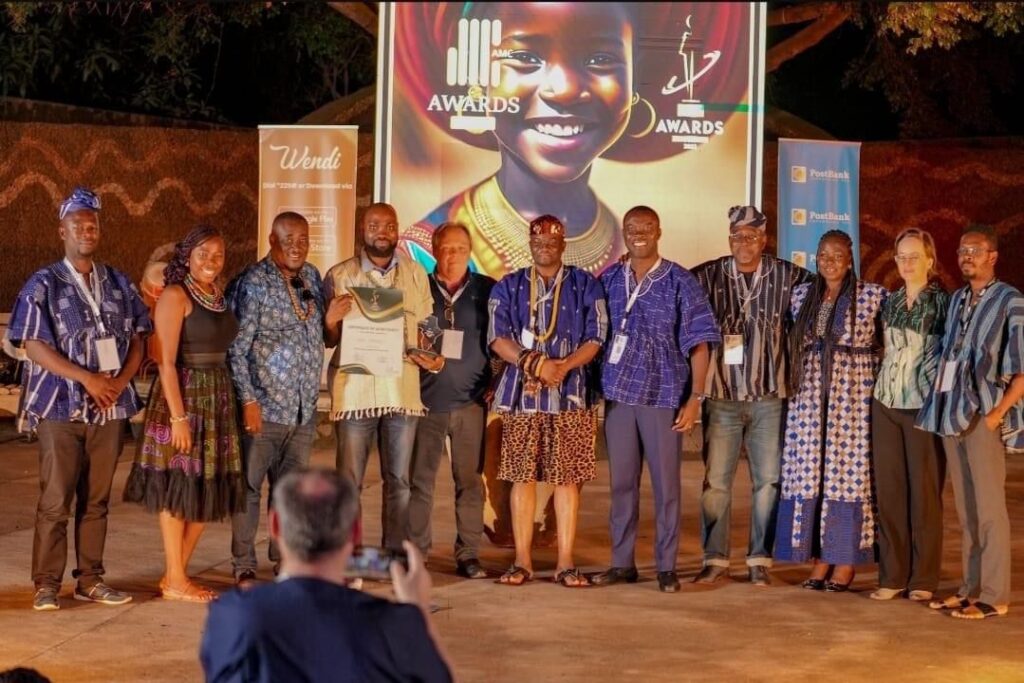
Team Ghana emerged victorious, clinching the prestigious title of Tech Business Leader of the year!
We congratulate Louis Amenyo Adanuty , the CEO of Teksol and Eganow, for blowing away the panel judges with his innovative ideas and exceptional leadership skills. Looking to Kenya hosting the next gathering of ICT giants from across the continent.
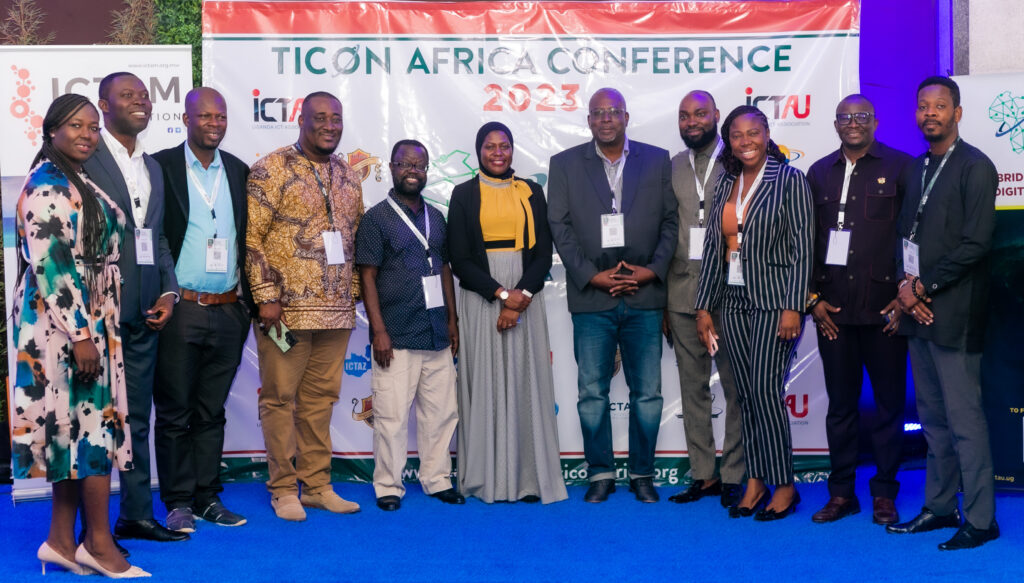

The 5 members were proudly sponsored by AFOS Foundation through the German Federal Ministry for Economic Cooperation and Development (BMZ) within the framework of the Special Initiative “Decent Work for a Just Transition” via sequa gGmbH.
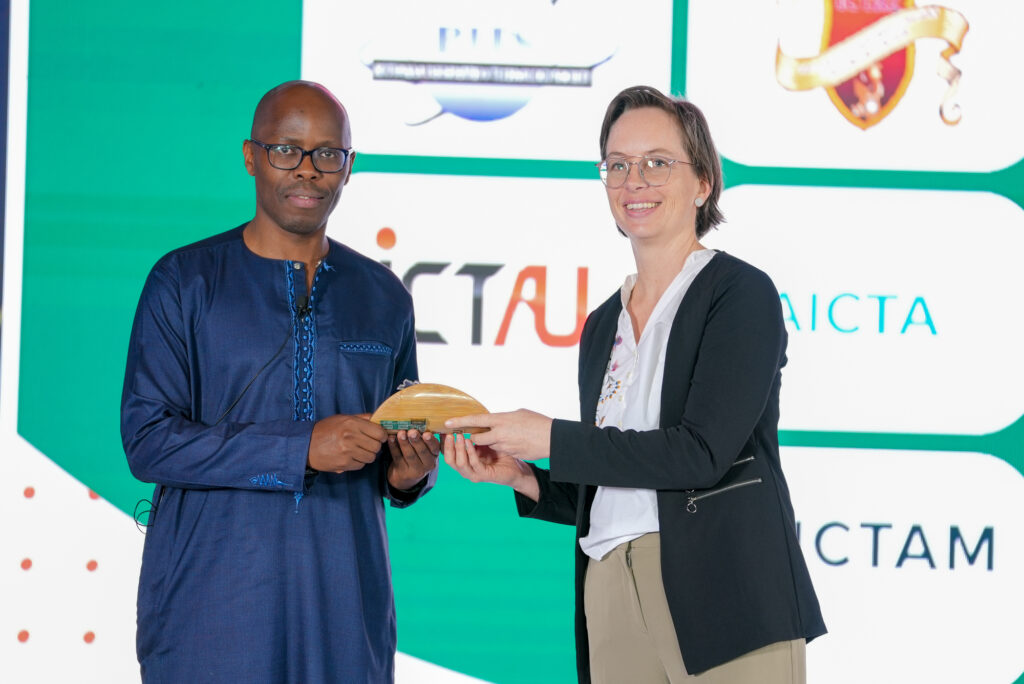
Author: Kafui Amanfu, Director of Operations, IIPGH
For comments, contact richard.amanfu@iipgh.org or Mobile: +233244357006

